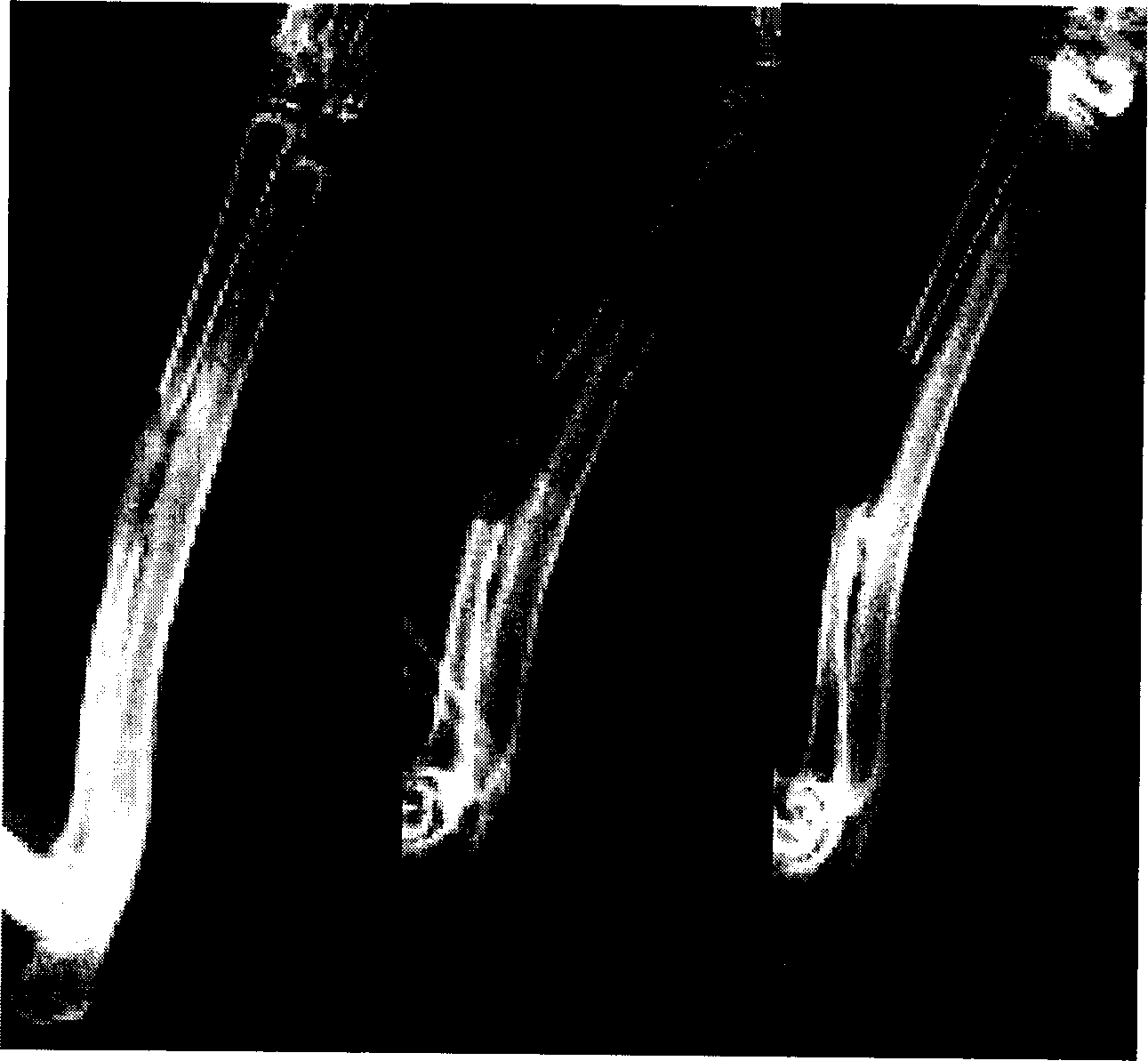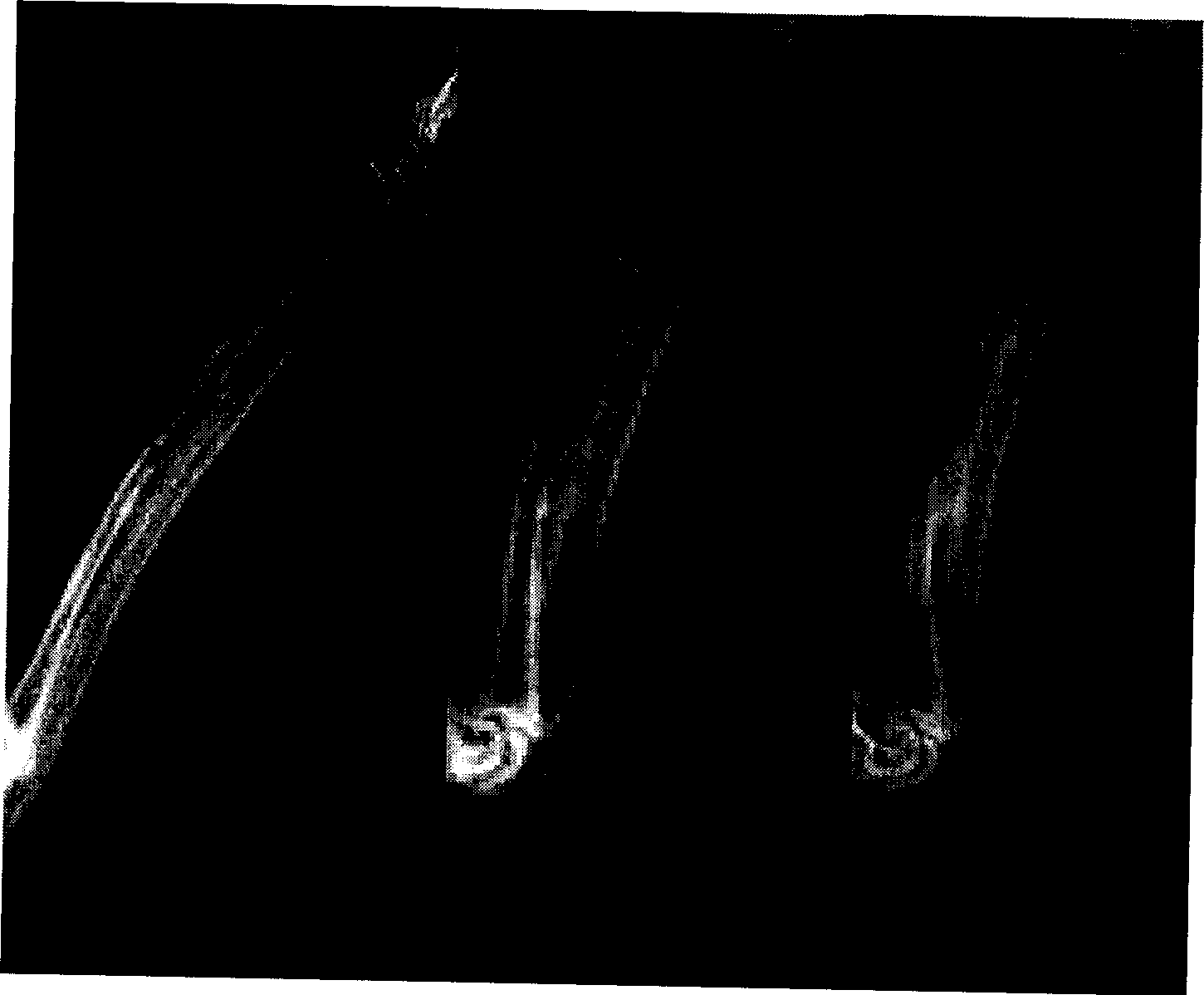Injected tissue engineering bone and its constrction and application
A tissue-engineered bone and injection-based technology, which is applied in bone diseases, drug combinations, medical preparations containing active ingredients, etc., can solve the problems of complex cell operation, expensive exogenous cytokines, etc., and achieve easy compounding and promotion. The effect of fracture healing and simple operation
- Summary
- Abstract
- Description
- Claims
- Application Information
AI Technical Summary
Problems solved by technology
Method used
Image
Examples
Embodiment 1
[0037] Example 1: Culture and induction of differentiation of bone marrow stromal stem cells.
[0038] New Zealand white rabbits, provided by the Animal Institute of Nanfang Hospital, Southern Medical University (formerly First Military Medical University), were anesthetized by intramuscular injection of Sumianxin, ketamine and atropine compound solution. Extract 3ml of red bone marrow from bilateral iliac crests, anticoagulate with heparin solution, mix into DMEM medium, centrifuge at 1000r / min for 10min after mixing, discard the suspended fat cells and part of the supernatant, pass through a 100-mesh filter, and add DMEM complete medium (containing 15% fetal bovine serum) inoculation. 37°C, 5% CO 2 Culture in an incubator, change the full amount of medium after 3 days, and change the medium once in half of the next 2 to 3 days. After the cells cover 80% of the bottom of the bottle, digest with 0.25% trypsin, and subculture with DMEM conditioned medium (containing 10% fetal ...
Embodiment 2
[0039] Embodiment two: the extraction of PRP.
[0040] Under aseptic conditions, 5ml of central artery blood was extracted from the dorsal ear of rabbits, and anticoagulated with 0.5ml of 10% sodium citrate. Centrifuge at 3000r / min for the first time at 20°C for 10 minutes, and absorb the supernatant and 3 mm components below the buffy coat. Centrifuge for the second time at the same temperature at 3600r / min for 15 minutes, discard the upper 3 / 4 supernatant, and the remaining part is PRP. Vortex gently to mix. The platelet content was counted under a high power microscope and compared with whole blood. The number of platelets in the PRP constructed by this method is more than 4 times higher than that in whole blood. Make about 0.6ml of PRP per 5ml of whole blood, and store it in a -70°C refrigerator for later use.
Embodiment 3
[0041] Example 3: Construction of injection-type tissue engineered bone.
[0042] Injectable tissue engineered bone consists of solution A and solution B. Solution A is to dissolve fibrinogen with aprotinin solution and mix it with PRP at a ratio of 3 to 6:1, and add bone marrow stromal stem cells induced to differentiate and proliferate in vitro according to the method described in Example 1, and the cell density is 5× 10 6 -1×10 8 / ml. The concentration of aprotinin is 2000~6000U / ml. Solution B is calcium chloride and thrombin solution, the concentration of calcium chloride is 40mmol / ml, and the concentration of thrombin is 400U / ml. When in use, draw solution A and solution B separately with a double syringe. Mix and inject solutions A and B at a ratio of 9:1 to 1:1. It forms a jelly-like gel within 20-30 seconds when injected into the body, and also forms a gel in vitro.
[0043] Such as figure 1 As shown in the scanning electron microscope, the gel is a fibrous gri...
PUM
| Property | Measurement | Unit |
|---|---|---|
| concentration | aaaaa | aaaaa |
Abstract
Description
Claims
Application Information
 Login to View More
Login to View More - R&D
- Intellectual Property
- Life Sciences
- Materials
- Tech Scout
- Unparalleled Data Quality
- Higher Quality Content
- 60% Fewer Hallucinations
Browse by: Latest US Patents, China's latest patents, Technical Efficacy Thesaurus, Application Domain, Technology Topic, Popular Technical Reports.
© 2025 PatSnap. All rights reserved.Legal|Privacy policy|Modern Slavery Act Transparency Statement|Sitemap|About US| Contact US: help@patsnap.com



